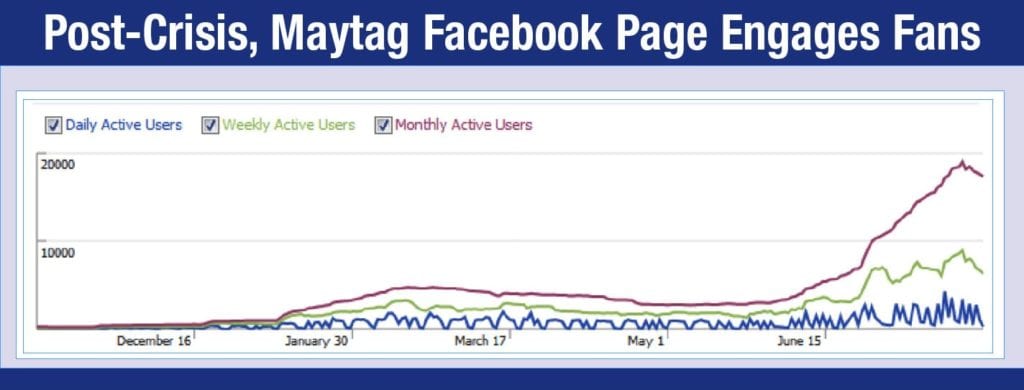 |
| Playing off product dependability, Peppercom and Maytag supported an ad campaign that allowed fans to name their own most dependable people. Photo courtesy of Peppercom |
Company: Maytag
Agency: Peppercom
Timeframe: April 2010-Present
Most brands launch their Facebook pages willingly to engage their customers and build a community. And some more unfortunate brands launch Facebook pages as a response to a crisis.
Such was the case with Maytag, which launched its page with PR agency Peppercom in April 2010 during a product recall. Under a mandate from the Consumer Product Safety Commission (CPSC), the page would serve as a way to disseminate information after Maytag recalled 1.7 million dishwashers because of a fire hazard—hardly a base for gaining fans and sparking positive dialogue.
At the time, a strategy was being developed for a potential 2011 launch of the Maytag page on Facebook, but the dishwasher recall quickly changed that. Thrust into a harsh environment and forced to tell a negative story, the goals for the Maytag Facebook page were to:
• Drive down negative comments and eventually gain positive interaction with fans.
• Turn the Maytag Facebook fan page from a consumer information site to a true consumer engagement Facebook fan page.
SURVEYING THE LANDSCAPE
Maggie O’Neill, partner and senior director at Peppercom, said the 10-person combined Maytag/Peppercom PR team researched best practices for handling a recall on Facebook, but Maytag’s situation was unparalleled. “This was the first example we had seen where a brand was mandated to initiate a Facebook presence as part of the recall process,” says O’Neill. To try to understand what works and doesn’t work on Facebook during a crisis, the team studied the communications of some auto manufacturers, like Toyota, and how they handled their recent recalls.
“We knew that our ultimate goal was to appropriately address the recall, and then reshape the page with positive consumer dialogue,” says O’Neill, who envisioned the page as a place where consumers could get help with their own appliances and learn fun tips like how to get stains out of their shirts.
“Maytag is all about dependability and reliability as a brand, so our content focus while turning the page around was to express a history of dependability,” says O’Neill. But first, the team had to endure the recall crisis.
GETTING OFF THE GROUND
The CPSC had strict guidelines regarding the Maytag recall. The brand was allowed to post just once about the recall with very specific information, and the page had to serve strictly as a recall site for one month.
After the first month, in which negative posts and questions piled up on the page, Peppercom and Maytag decided it would be best to extend the recall heading to three months to allow for a cooling-down period. “Not every affected consumer immediately knows when there’s a recall issued,” says Monica Teague, senior manager of PR and brand experience for Maytag. “It takes consumers a while to become informed, so we didn’t want to rush anyone suffering through the duress of an expensive purchase in this economy.”
TOUGH CROWD
The first 400 “fans” who liked the page during the recall were not necessarily pleased with the brand (and understandably so), but the page did have rules of engagement that visitors needed to abide by.
“We’d delete posts if there was offensive language or threats to employees,” says O’Neill. The team did establish protocol to respond to comments in an extremely timely matter—even if it was letting them know that customer service had been alerted.
Since the CPSC restrictions were lifted after the first month, a Maytag team of customer service members called the Digital Detectives was brought in to respond to consumer questions posted on the page. The Digital Detectives would often try to take the conversation offline—not to remove any negativity, but to better address consumers’ individual customer care issues.
NEW BEGINNING
After the three-month recall period, the PR team started to build positive sentiment for the brand by posting twice per week. They stayed away from overly promotional posts, focusing instead on educational topics with laundry, cooking and household tips. Initially, some of the posts’ responses were negative and tended to come from those who joined the page during the recall. But, some consumers started to defend the brand.
 |
| Mandated in April 2010 by the Consumer Product Safety Commission to create a Facebook page to handle a product recall, Maytag and PR agency Peppercom began to change the page’s dialogue from negative to positive, resulting in increased engagement from Nov. 2010 to August 2011. Source: Peppercom |
POST STRATEGIES
Each Facebook community’s post threshold is unique, and the team began to shorten post intervals while trying to find a balance with fans. “The Maytag consumer will participate and engage with up to a certain number of posts, and after that we found we’d lose followers if there was too much,” says O’Neill. While posting five days a week would cause “unlikes,” three posts per week would help gain fans. The team also found that posts asking consumers about features on appliances increased engagement threefold.
For Teague, the most difficult aspect of the campaign was waiting to get from the recall stage to a more positive level of engagement. “Starting with such negativity, it killed us that we couldn’t react and engage with some of the consumers who were so upset,” says Teague. “That’s not how you want to manage your page, and it was difficult waiting to interact with consumers in a positive way.”
POSITIVE PUSH
To finalize the page’s conversion, a sweepstakes was launched to bring in additional fans. The team used a Facebook application (see sidebar for more on how to legally conduct a sweepstakes) in January 2011 to create a “Big Game” sweepstakes promoting a new four-door refrigerator—touted as perfect the fridge for the Super Bowl for its accessible external pantry drawer.
Additionally, the team created a series of monthly “American Pride” videos, in which the Maytag Repairman visited plants, distribution centers and call centers that build, distribute or service Maytag products. The scripts focused on the employees, the dependability of the appliances and the towns where the facilities were located.
The PR team collaborated with advertising agency Arc for the “Faces of Dependability” campaign, which recognized four Boys & Girls Club staff members who are particularly dependable for kids in their communities.
The PR team leveraged their stories as well, pitching media and placing ensuing articles on the Facebook wall. Arc developed an app in conjunction with Peppercom, asking fans to tell the brand who they find dependable and post their stories in a gallery on the page.
WALKING A FINE LINE
Looking back, O’Neill says they could have been less cautious. “We might have been a little too patient in starting the positive conversation, considering how well-received it was once we started it,” she says. O’Neill notes that they were a bit uncomfortable with engaging in open dialogue on the page after launching in a negative environment. “It’s something we should’ve been less afraid of—we might have gotten to a good place even quicker,” says O’Neill. Despite its humble start, the Maytag Facebook page went from 400 disenchanted fans to 42,000 fans as of December 2011. Other results include:
• Engagement increased by 4,000% over the course of 2010.
• The “Big Game” sweepstakes increased likes by 5,000 and ultimately began the wave of engagement.
• The “Faces” gallery received over 12,000 submissions.
• Money magazine wrote an article that mentioned a positive customer service interaction on Maytag’s Facebook page.
No longer the social center of a recall, the Maytag Facebook page lives on today in a positive light, as the team maps out plans for expansion and more positive engagement in 2012. And, should another recall occur, they’ll be addressing it from a position of strength to a much more loyal community. PRN
CONTACT:
Maggie O’Neill, [email protected]; Monica Teague, [email protected]; Allison Fitzpatrick, [email protected].
